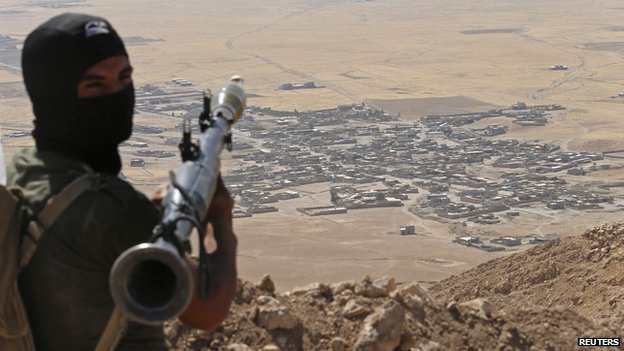Iran arrests ‘Afghans and Pakistani Deobandis joining Islamic State’
Iran says it has arrested Afghan and Pakistani Deobandi citizens who were trying to join Islamic State (IS) jihadists fighting in Syria and Iraq.
Iranian Interior Minister Abdolreza Rahmani said the foreigners planned to cross Iran – but did not specify how many had been arrested, or where.
Shia Iran is opposed to the Wahabi/Deobandi extremists of IS, who have undermined its allies in Iraq and Syria.
Iran is said to be prepared to work alongside the US against IS in Iraq.
Sources in Tehran told BBC Persian last week that Iran’s Supreme leader, Ayatollah Ali Khamenei, had authorised his top commander to co-ordinate the fight against IS with US, Kurdish and Iraqi forces.
However, Iran’s foreign ministry denied that it would co-operate with the US against IS.
Iran has traditionally opposed US involvement in Iraq, an Iranian ally.
Recently however, both the US and Iran have offered military assistance to combat IS in Iraq, while refusing to place their troops on the ground.
US Secretary of State John Kerry is due in Jordan and Saudi Arabia on Tuesday to try to build regional support to counter the threat posed by Islamic State, a US state department spokeswoman said.
 IS fighters have taken large swathes of Iraq and Syria. Here they parade in Raqqa, Syria
IS fighters have taken large swathes of Iraq and Syria. Here they parade in Raqqa, SyriaFighters led by IS, an extremist group which is also known as Isis and Isil, seized a large stretch of borderless territory across Iraq and Syria this summer, declaring the land they control a caliphate.
Iran borders Iraq to the west, and Afghanistan and Pakistan to the east.
US President Barack Obama is expected to detail a plan of action against IS in a speech on Wednesday.
Mr Obama has been heavily criticised for remarks at a recent press conference when he said that the US had yet to form a strategy for dealing with IS.
US President Barack Obama wants to demonstrate that he is acting in concert with an international coalition and not going it alone, now that America is being dragged back into an unpopular war in Iraq.
Already Nato allies have indicated that they are on board to help with military assistance. The emphasis will probably be on training, equipment and arms for Iraqi and Kurdish forces, who will be the “boots on the ground” while the US bombs IS militants from the air.
A few Nato countries may help with air strikes, although nothing has been announced. In the region, the plan hinges on a new Iraqi government that has taken steps to include the alienated Sunni constituency and endorsed the anti-IS coalition.
The leaders of Sunni countries will be asked to demonstrate solidarity with Baghdad in the fight against IS militants – until now, they have treated the Shia-dominated government there as an outpost of Iran – and to convince Sunni tribes in Iraq to work with it.
Regional states will also be pressed to clamp down on the flow of funding to Syrian Islamist groups and tighten border controls against foreign fighters. However, there are no immediate plans to extend the air strikes to Syria.
IS militants retreated from a wide area around the strategic Haditha dam in the western province of Anbar, the Iraqi army said on Monday.
The military offensive took place with the help of US air strikes – the first to have taken place outside northern Iraq.
Recent strikes have also helped Kurdish forces seize a strategic mountain overlooking the city of Mosul, which was captured by IS in June.
US air raids have also helped tribal fighters and Iraqi forces to clear IS militants from the area around Haditha dam in the western province of Anbar.
Source:
http://www.bbc.com/news/world-middle-east-29116764


